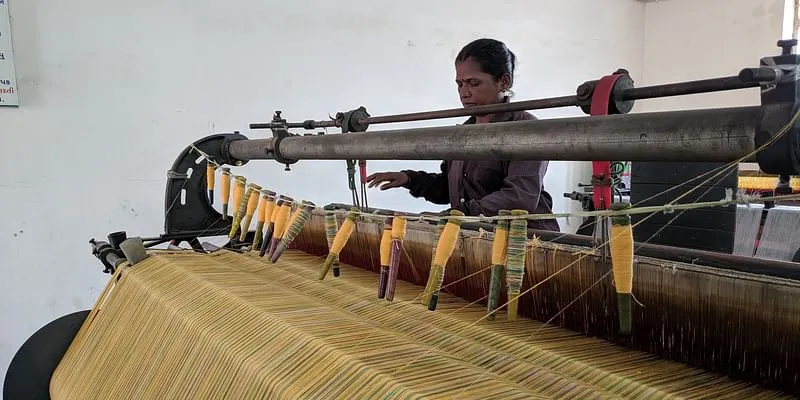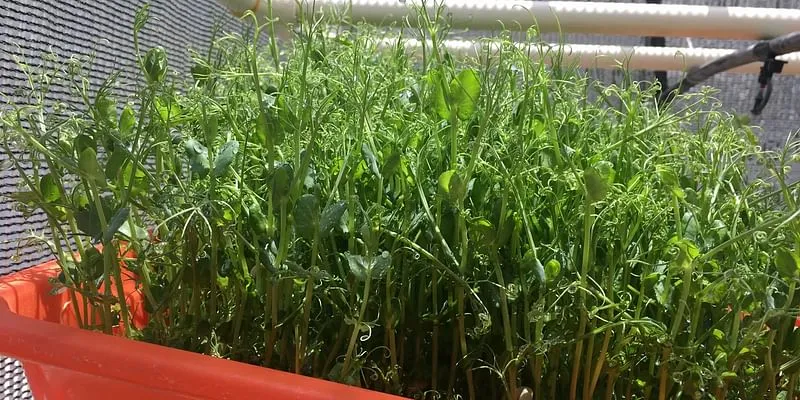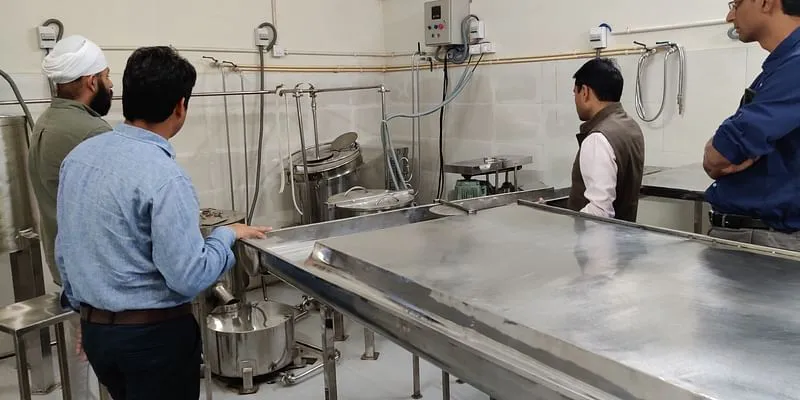This Rs 22 Cr initiative empowers clean energy-based livelihood solutions in India
Powering Livelihoods, an initiative by Council on Energy, Environment and Water (CEEW) and Villgro Innovations Foundation, aims to boost India’s rural economy by supporting clean energy solutions.
Dharambir Kamboj was a rickshaw puller in Delhi and found it difficult to even pay for his daughter’s school fees. Adding to his woes, he met with an accident and had to return to his village in Damla, Haryana. But once he recovered, Dharambir turned his career towards organic farming.
As he began farming, he soon realised that there was no way to process his fruit and herb yields. So with limited resources, he struggled for over eight months to design and build the first prototype of a cost-effective multipurpose food processing machine.
By 2012, Dharambir managed to grow his offering into a small machine manufacturing unit, receiving 21 awards and recognitions for his enterprise.
“Our multipurpose food processor can run on solar energy and is especially useful in areas with unreliable electricity. However, at present, we are not able to meet the high demand for our machines as we do not have enough funds at our end to expand,” Dharambir tells SocialStory.
But thanks to being identified by an initiative called ‘Powering Livelihoods’ as one of the top six clean-energy based livelihood solutions, the social enterprise Dharambir Food Processing has received funding from the initiative which, according to the farmer, “would help scale up, in turn, helping end-users of the products to significantly increase their incomes.”
So far, Dharambir has been able to deploy 400 machines, create over 2,000 jobs and see an average income increase of about 100-150 percent.
Like Dharambir’s enterprise, Powering Livelihoods has identified five other social enterprises which provide similar clean energy-based solutions that provide livelihoods and give them the necessary technical and financial support.

Solar-powered Charkha
Powering Livelihoods
‘Powering Livelihoods’ is a Rs 22 crore initiative that was co-initiated by Council on Energy, Environment and Water (CEEW), and Villgro Innovations Foundation. Its goal is to boost India’s rural economy by supporting Indian enterprises working on clean energy-based livelihood solutions. The two organisation came together with the common goal envisioning clean energy playing a major role in the empowerment of rural livelihoods
“We researched to identify the potential for clean energy-based livelihood solutions between 2017 and 2018. We realised the key issues that we need to resolve, and worked with a bunch of ecosystem players to start responding to these issues,” says Abhishek Jain of CEEW, who is currently leading the initiative.
India has a market of more than Rs 3.7 lakh crore ($50 billion) for clean energy-based livelihood solutions. By enabling commercial deployments of these solutions, Powering Livelihoods aims to unlock finance, investment, and policy support for the sector.
The sector sees a significant opportunity but is in its fairly early stages – implying that policymakers, financiers, investors and other market participants are not confident about the promise of this ecosystem, explains Abhishek.
However, without sufficient deployment numbers by social enterprises, it becomes difficult for investors and financiers to visualise the impact and vice versa, creating an endless loop of underconfidence.
“Powering Livelihoods is trying to bring in both capital and technical assistance to select enterprises, and help them deploy the solutions in thousands, generate evidence from the ground on whether these solutions are viable and scalable,” says Abhishek.
These solutions are primarily based in the agricultural and textile-based value chain, with a whole range of clean energy offerings like solar-powered sewing machines and charkhas, low-cost, micro climate-controlled grow houses, portable and multi-purpose processing machine, among others.
The initiative started with a call for applications, receiving around 100 responses. After multiple rounds, six of the most promising enterprises were chosen.
They are Resham Sutra (Delhi), Greenwear Fashion (Lucknow), Dharambir Food Processing (Yamuna Nagar), Khethworks (Pune), Devidayal Solar Solutions (Mumbai), and Hydrogreens Agri Solutions (Bengaluru).
The impact on the enterprises
One of the enterprises, Greenwear Fashion has supported more than 1,700 rural artisans and generated a potential monthly income of about Rs 6,000, having produced more than 450,000 metres of fabric.
Similarly, Resham Sutra, an enterprise that uses solar-powered machinery for the rural textile production value chain, has installed more than 11,000 machines, impacted more than 40,000 people, and trained more than 18,000 women to date. Kunal Vaid, Founder of Resham Sutra, says:
“There are more than 15 million unemployed or underemployed rural women in India. This initiative would help us expand the market and provide livelihoods to the poorest of the poor.”
On the agricultural front, the initiative has supported Dharambir Food Processing, Devidayal Solar, Hydrogreens Agri Solutions, and Khethworks. While Devidayal has deployed more than 170 off-grid DC solar refrigerators, Hydrogreens has instituted a $2 million+ market for green fodder in India with their low-cost, micro climate-controlled grow house.
"Powering Livelihoods has helped us stay stronger in creating purposeful products and models that improve rural prosperity despite the challenging climate. Their support in creating and evaluating financial models, planning and assessments of needs has helped us sharpen our strategy and execution,” says Vasanth Kamath, Founder, Hydrogreens Agri Solutions
Founded by Victor Lesniewski and Katherine Taylor, Khethworks enables smallholder farmers to have year-round irrigation and cultivation by developing and delivering small, portable, hyper-efficient, and affordable solar-powered pumps to eastern and north-eastern India.
"Powering Livelihoods is providing timely resources and support to address some of our biggest challenges to, and opportunities for, achieving commercialisation and impact: viable business models beyond government channels that reach, serve, and centre the needs of marginal farmers, among others,” says Victor Lesniewski, COO and Co-founder, Khethworks.

Hydrogreens' fodder growing system (Image: Hydrogreens Agri Solutions)
Funding and support
“We worked with these enterprises to understand their requirements and see what needed to be done to fine-tune their business models. Moreover, we have a ‘funders’ committee with about 15 investors and financiers who meet every quarter to assess not only the growth and the journey of the sector as a whole, but also to provide a follow-on funding to these enterprises,” says Abhishek.
International foundations like the IKEA Foundation, Shell Foundation, DOEN Foundation, and Good Energies Foundation are the main funders behind the Rs 22 crore initiative, in addition to funding by the UK Government.
At present, they are in talks of signing the final agreement of disbursing at least Rs 1.5 to 2 crore to each of these enterprises for the next two years, and also underline the milestones that these enterprises have to hit.
“These are milestone-based grants, with multiple tranches going out with the completion of each milestone,” says Abhishek.
While they are helping these enterprises at the forefront, they have also enlisted 11 other enterprises in the sector which are getting some light support in terms of capacity building and need-based solutions from the programme.
The initiative is sharing the success stories with the investors, financiers and policymakers. This can aid the development of the sector on the whole.
In recent times, owing to the disruption caused by the pandemic, they offered additional emergency funding of Rs 1 crore to the six enterprises to tackle the ongoing challenges.

Solar powered food-processing unit
Way forward
‘Over two years, we are hoping that the cumulative growth of these enterprises will increase by at least four-fold. We are also hoping to unlock a $10 million follow-on funding for the sector as a whole,” says Abhishek.
Apart from the number of beneficiaries in the programme, Powering Livelihoods also hopes to see that the extent of income increase is sufficient.
They are ensuring that at least 75 percent of the livelihoods improve their income by at least 20 percent. In addition, they are also trying to bring about key policy changes, and are already in talks with the Ministry of New and Renewable Energy (MNRE) on how to leverage clean energy to generate livelihoods.
“Ultimately, it is the number of micro-entrepreneurs and the extent of income impact we can create, and drudgery we can reduce for every enterprise,” Abhishek concludes.
Edited by Kanishk Singh









